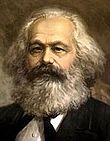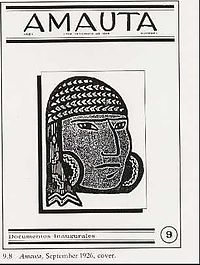- José Carlos Mariátegui
-
 Mariátegui in 1928
Mariátegui in 1928
José Carlos Mariátegui La Chira (14 June 1894– 16 April 1930) was a Peruvian journalist, political philosopher, and activist. A prolific writer before his early death at age 35, he is considered one of the most influential Latin American socialists of the 20th century. Mariátegui's most famous work, Seven Interpretive Essays on Peruvian Reality (1928), is still widely read in South America. An avowed, self-taught Marxist, he insisted that a socialist revolution should evolve organically in Latin America on the basis of local conditions and practices, not the result of mechanically applying a European formula.
Contents
Life and works
Part of a series on Marxism  Social sciencesAlienation · Bourgeoisie
Social sciencesAlienation · Bourgeoisie
Base and superstructure
Class consciousness
Commodity fetishism
Exploitation · Human nature
Ideology · Proletariat
Private property
Reification · Cultural hegemony
Relations of production
Scientific socialism
ImmiserationCapitalist mode of production
Socialist mode of production
Capital accumulation
Commodity (Marxism)
Marxian economics
Communism
Economic determinism
Labour power · Law of value
Means of production
Mode of production
Perspectives on Capitalism
Productive forces
Surplus labour · Surplus value
Transformation problem
Wage labour · Crisis theoryHistoryCategoriesAll categorised articlesCommunism portal 
Mariátegui was born in Moquegua. His father, Francisco Javier Mariátegui Requejo, abandoned his family when José Carlos was young; to support his children, his mother, María Amalia La Chira Ballejos, moved first to Lima, then to Huacho, where she had more relatives that helped her make a living. José Carlos had a brother and a sister: Julio César and Guillermina. In 1902, as a young schoolboy, he badly injured his left leg, and was moved to a hospital in Lima. Despite a four-year-long convalescence, his leg remained fragile and he was unable to continue his studies. The injury led to severe health problems later in life.
Though he hoped to become a Roman Catholic priest, at age of fourteen, he started working at a newspaper, first as an errand boy, then as a linotypist, then eventually as a writer. He worked in daily journalism for La Prensa and also for the magazine Mundo Limeño. In 1916, he left his first employer to join a new daily, El Tiempo, which had a more leftist orientation. Two years later he launched his own magazine, only to find that the owners of El Tiempo refused to print it. This led him to break with El Tiempo and launch a newspaper called La Razón, which became his first major venture in left wing journalism. In 1918, "nauseated by Creole politics," he wrote in an autobiographical note, "I turned resolutely toward socialism."
The newspaper led by Mariátegui waged a vigorous defense of the campaign then underway for reform of the universities, and went on to become a tribunal for the defense of the young labour movement. La Razón supported a strike for the eight-hour day held in May 1919, along with lowering the cost of subsistence goods. The paper’s aggressive radicalism brought it into conflict with the Leguía government, and it was rumoured that the ruling circles offered Mariátegui a choice: either go to jail, or travel to Europe with government assistance. In any event, Mariátegui left for Europe in 1920, traveling through France, Germany, Austria and eventually living in Italy for two years, where he married an Italian woman, Ana Chiappe, with whom he had four children. He was in Italy during the Turin factory occupations of 1920, and in January 1921 he was present at the Livorno Congress of the Italian Socialist Party, where the historic split occurred that led to the formation of the Communist Party. By the time he left the country in 1922, Benito Mussolini was already on his way to power.
In his writings from that period, Mariátegui observed that fascism was a response to deep social crisis, that it based itself on the petty bourgeoisie of town and country, and that it relied heavily on a cult of violence. According to him, fascism was the price that a society in crisis paid for the failures of the left.
Upon his return to Peru in 1923, he began giving in lectures to the Student Federation in the People’s University and writing articles about the European situation. He also began using Marxist methods to study Peru. Mariátegui also came into contact with and allied himself with Víctor Raúl Haya de la Torre, leader of the populist movement American Popular Revolutionary Alliance (APRA). In October 1923, Haya de la Torre was deported by the Leguía government, leaving Mariátegui as the editor of the magazine Claridad. The fifth issue of the publication in March 1924 was dedicated to Vladimir Lenin.
In 1924, Mariátegui nearly died, and his injured leg had to be amputated. In 1926, he established the journal Amauta to serve as a forum for discussions of socialism, art and culture in Peru and all of Latin America. In 1927, he was arrested and confined to a military hospital, and later subject to house arrest. He briefly considered relocating to Montevideo or Buenos Aires.
In 1928, Mariátegui became alienated from the APRA, and he set about establishing the Socialist Party, which formally constituted in October of that year, with Mariátegui as general secretary (it later became the Communist Party of Peru). That year, he published his best-known work, Seven Interpretative Essays on Peruvian Reality, in which he examined Peru's social and economic situation from a Marxist perspective. It was considered one of the first materialist analyses of a Latin American society. Beginning with the country’s economic history, the book proceeds to a discussion of the “Indian problem", which Mariátegui locates firmly within the “land problem”. Other chapters are devoted to public education, religion, regionalism and centralism, and literature.
Also in the same work, Mariátegui blamed the latifundistas, or large land-owners, for the stilted economy of the country and the miserable conditions of the indigenous peoples in the region. He observed that Peru at the time had many characteristics of a feudal society. He argued that a transition to socialism should be based on traditional forms of collectivism as practiced by the Indians. In a famous phrase, Mariátegui stated "the communitarianism of the Incas cannot be denied or disparaged for having evolved under an autocratic regime."
In 1929, Mariátegui participated in the establishment of the General Confederation of Peruvian Workers (CGTP), which then sent a delegate to Montevideo for the Constituent Congress of the Latin American Trade Union Conference.
Mariátegui died on April 16, 1930, of complications from his earlier affliction. His house at Jirón Washington in the center of Lima was later turned into a museum.
Influence
Mariátegui's ideas dramatically lost importance in Peruvian politics after the fall of Berlin Wall and the presidency of Alberto Fujimori. He has been overshadowed by the resurgence of classic liberalism.[citation needed]
In different ways, organizations like Shining Path, and the Túpac Amaru Revolutionary Movement, and the Peruvian Communist Party all look towards Mariátegui and his writings. Shining Path and the MRTA have even feuded over who best continues the tradition of his ideas, though it is arguable whether either of these organisations are genuinely influenced by Mariategui's thought in any meaningful sense.[citation needed]
Quotes
- Italian fascism represents, clearly, the anti-revolution or, as it is usually called, the counter-revolution. The fascist offensive is explained, and is realised in Italy, as a consequence of a retreat or a defeat of the revolution.
- I am self-taught. I once registered in Arts in Lima, but only in the interest of taking an erudite Augustine’s Latin course. And, in Europe I freely attended some courses, but without ever deciding to lose my extra-collegiate, and perhaps anti-collegiate, status.[1]
- Peru is a semi-feudal and semi-colonial country at the same time. Though this may seem as a paradox, this is a fact and has to be changed.
- The fight is long and tough, but together we can make it. 1932
Mariátegui is also responsible for coining the phrase, in reference to Marxism, sendero luminoso al futuro ("the Shining Path to the future"). This phrase later became the name of the Shining Path Maoist guerrilla organization in Peru as a means of differentiating them from other Communist groups (they preferred to be called the Communist Party of Peru).
Further reading
- The Heroic and Creative Meaning of Socialism Jose Carlos Mariategui. Selected Essays. - Edited and Translated by Michael Pearlman. 1996 Humanities Press, New Jersey
References
- ^ José Carlos Mariátegui, Autobiographical Note. January 10, 1927.
External links
- José Carlos Mariátegui Complete Photo Archive
- José Carlos Mariátegui Main Internet Portal
- José Carlos Mariátegui Internet Archive (articles, biography, and pictures)
- "The Problem of the Indian" (1928) (from Seven Interpretive Essays on Peruvian Reality)
- "José Carlos Mariátegui: Latin America’s forgotten Marxist" an introduction to Mariátegui's life and political views by Mike Gonzalez from International Socialism 115 (summer 2007)
- Indigenous Resistance in the Americas and the Legacy of Mariátegui by Roxanne Dunbar-Ortiz, Monthly Review
- Complete Works of Jose Carlos Mariategui in spanish
Categories:- 1894 births
- 1930 deaths
- Essayists
- Marxist journalists
- Peruvian sociologists
- Marxist theorists
- Peruvian communists
- Peruvian essayists
- Peruvian journalists
- Peruvian writers
Wikimedia Foundation. 2010.


